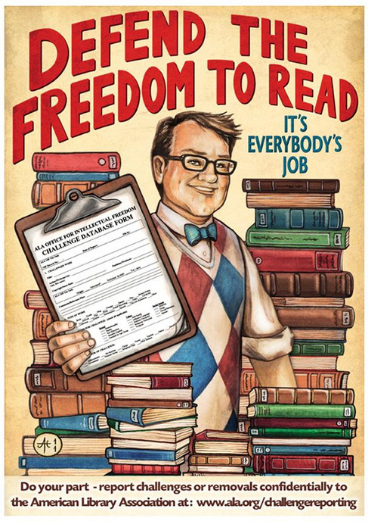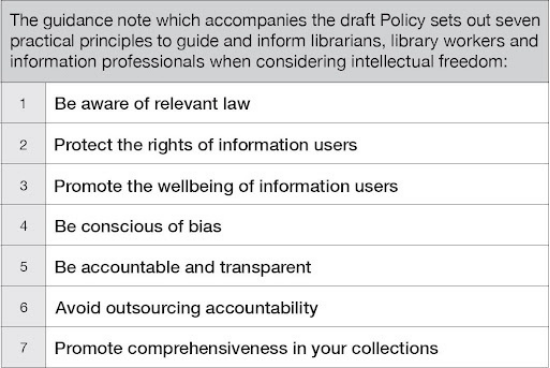
By Martyn Wade, Chair of CILIP Policy Committee
1 June 2022
Intellectual freedom has long been at the core of library and knowledge work and collecting, and has been at the heart of the work of CILIP and its predecessor organisations. Here Martyn Wade, Chair of CILIP Policy Committee, looks at
why it is as important as ever and how you can get involved.
In 1889, Thomas Lyster, then President of the Library Association, said “In a great library all things, good and evil, fall into their places, are seen in the just light and proportion, and the totality of the record of human thought and
feeling is a witness for what is wholesome, true and good.”
Paul Sturges, a long time advocate of intellectual freedom, and founding Chair of the International Federation of Library Associations and Institutions Advisory Committee of Freedom of Access to Information and Freedom of Expression (IFLA
FAIFE), writes that Lyster “sums up the role of libraries in access to information and ideas. Libraries should hold material representing all varieties of expression, without the interference of censors, because that will place readers
themselves in the position to form a well-informed judgement on what is good and what is harmful”, and that as active repositories of knowledge they have a clear and important role to play in the struggle against censorship.2
Today the challenges to intellectual freedom come from a growing range of sources and directions, in what can be a vociferous and often highly politicised environment.
Whilst always a topic of lively debate in CILIP, an impetus to discussions on intellectual freedom was provided by the establishment in late 2020 of a new Policy Committee, reporting to the Board.
The Policy Committee is tasked with advising the Board and supporting their work “to ensure that CILIP is able to fulfil its leadership role for the library, information and knowledge profession by establishing clear and consistent policies
to guide and support key aspects of sector development.”
The new Policy Committee was asked to look at updating CILIP’s Statement on Intellectual Freedom, Access to Information and Censorship, originally published in 2005.
Events in recent years have demonstrated a marked trend of increasing challenge to intellectual freedom, whether from the Government, political and social commentators or others with vested interests, including the fringes of the so-called
“war on woke”, “culture war” and “cancel culture”.
This increasingly partisan view on intellectual freedom has been accompanied by the growth of misinformation and fake news online accompanied by growing personal attacks using social media.
For example, during the summer of 2020 Black Lives Matter protests were held right across the United Kingdom. As part of these, the toppling in Bristol of the statue of Edward Colston, a trader in enslaved African people, made national
headlines. The UK Government, who many would argue had been increasingly adopting the tone and language of the “war on woke” or a “culture war” responded by developing proposals to enforce the adoption of a policy of “retain and explain”
by cultural and heritage organisations – a direct challenge to curatorial and intellectual freedom.
In February 2021, following a meeting with “leading heritage organisations” – including the British Library – the then Culture Secretary Oliver Dowden announced a working group would be set up and guidelines published to put “retain and
explain” into practice despite claiming that the Government “absolutely support the independence of museums and the heritage sector”. 3
Since then, the Museums Association has reported concerns that the Government was looking to deny funding to projects it considered “political” and that they were encouraging a “culture war” over contested heritage. The Museums Association
also reported that the appointment of some trustees to public bodies was being blocked because they held different views from the Government.4
Whilst museums have been the main targets of this particular approach (which only applies to England) the “war on woke” is a consistent theme that can impact on all culture, heritage and knowledge organisations.
There are signs that the Government is becoming increasingly intolerant of dissenting views across their agenda. The Police, Crime, Sentencing and Courts Bill is aimed at restricting forms of public protest and the more recent Online Safety
legislation allows for increasing government control over and interference in communications and content.
There is also evidence that censorship and efforts to restrict access to materials and content are on the rise in our societies. This is not just the case in autocratic countries where control is a way of life. The American Library Association
(ALA) Office of Intellectual Freedom regularly reports on the banning of books from school and public libraries, and Indiana and Iowa state legislatures are considering legislation that could leave librarians and information professionals
open to criminal prosecution for providing access to certain titles.

More recently, we have seen this issue spill across into public libraries in the US, which accounted for more than 37 per cent of book challenges in the past year (according to figures published by the ALA).
In the UK and Europe, censorship tends to be less political and visible, but anecdotally is not uncommon especially in schools where librarians and information professionals can just be asked to remove certain titles. A British school
librarian, for example, was recently asked not to share on social media images of a book display featuring titles addressing LGBTQ+ identities.
Similarly, they can be instructed to remove displays and cancel author visits concerning “inappropriate” topics or themes. Despite the best efforts of dedicated staff, this overall atmosphere can have a chilling effect, with self-censorship
becoming a real issue – if difficult to quantify.
The near universal access to online media – especially social media – is presenting challenges to intellectual freedom that were unimaginable in 2005. The sheer volume of un- (or lightly) mediated content, misinformation, and fake news
provides major challenges; however, the apparently unstoppable flow of intimidation, threat, pile-on and other forms of challenging intellectual freedom is also having a major impact.
This increasingly difficult environment for intellectual freedom has prompted CILIP to launch a new consultation with our community and the wider sector in order to develop a new Policy on Intellectual Freedom and accompanying guidance.
CILIP’s own web page on Freedom of Information defines this as “the right to access and share information, to intellectual activity and creativity, to expression and debate. A fair and prosperous democratic society is built upon access
to information and ideas, the ability to develop knowledge and communicate with others.”

Principles of Intellectual Freedom.
Intellectual freedom includes concepts and terms such as the freedom of expression, freedom of access to information, and free speech.
The draft policy takes human rights as its starting point. The United Kingdom is a signatory to the Universal Declaration of Human Rights5 and in addition the European Convention on Human Rights6 has been
adopted within UK law. Both declarations of rights guarantee the individual’s right to intellectual freedom.
The draft also builds on CILIP’s Ethical Framework and Principles, which govern our behaviour as a profession.7
The draft Policy itself is intended to be concise:
“In line with CLIPs Ethical Principles, as library and information professionals we are committed to upholding, promoting and defending human rights, equality and diversity, and intellectual freedom including freedom from censorship.
In all our work we have an active responsibility to promote intellectual freedom. We must also oppose efforts to restrict these rights whether intentionally through overt action or unintentionally through neglect. Attempts to restrict
intellectual freedom can be made by state actors, vested interests or any other party or individuals.
CILIP, as the professional body, has a commitment to support library and information workers by upholding, promoting and defending human rights, equality and diversity, and advocating for intellectual freedom and freedom from censorship.”
The draft policy is supported by a guidance note which sets out seven practical principles to help librarians, information professionals and library staff in their work.
The guidance is aimed at supporting individuals to apply the policy to the best of their ability in sometimes difficult circumstances. It is recognised that many librarians and information professionals work in environments where they
either do not control the systems or procurement processes of their institution or are otherwise unable to influence the policies under which they operate. The guidance is intended to give help and support to individuals in such
circumstances.
The new policy on intellectual freedom is an important document that covers a subject at the heart of what we are, and what we do as librarians, library workers and information professionals. We are committed to ensuring that there
is widespread consultation on the draft policy. There will be a number of opportunities to give your views and thoughts on the draft, and I hope that you will contribute your experiences to the good practice guide and anonymised
case studies that will help support fellow colleagues.

Timeline.
Share your views – consultation process
In April, CILIP launched a two-part consultation in order to develop a new Policy on Intellectual Freedom and accompanying guidance.
During Phase One (April to May), we will be writing to our CILIP Member Networks, Special Interest Groups and Devolved Nations to solicit their feedback on our initial draft.
During Phase Two (June to August) we will open the policy out for full sector consultation, in the hope of engaging as broad a range of views and experiences as possible.
Throughout the consultation period, we will be holding a series of discussion sessions, webinars and engagement events with the aim of hearing about the challenges faced by librarians and information professionals and how this Policy
can help them in their work.
The draft Policy, guidance note and supporting materials are live throughout the consultation period on CILIP's Intellectual Freedom webpage.
References
1 & 2 Paul Sturges From Fighting censorship to Promoting Transparency; in: Prochnicka, M. and Korycinska-Huras,
A. Eds. Between Past and Future: Book, Library, Information Science – Social Functions over the Centuries. Krakow: Jagellonoian University Press, 2007. Pp. 185-194.
3 Museums body warns of government ‘interference’ in contested heritage. BBC News website, 24 February 2021.
4 Government interference in heritage threatens freedom of speech warn historians Museums Associations 24 March 2021 and Alarm over free speech after government vetoes RMG trustee Museums Association 4 May 2021
5 Universal Declaration of Human Rights
6 European Convention on Human Rights
7 CILIP's Ethical Framework
Banner photo: Freedom by Ian Sane CC BY 2.0







